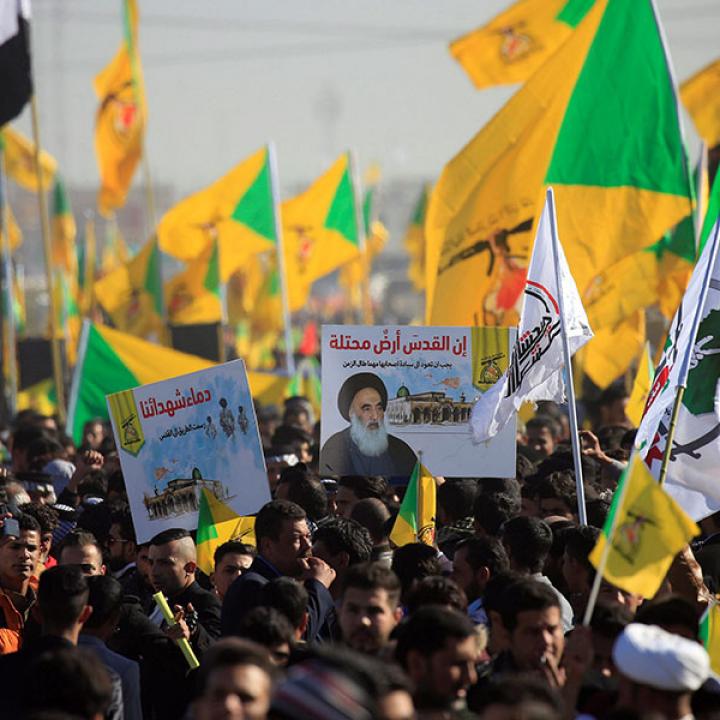
- Policy Analysis
- Policy Alert
Leveraging U.S. Sanctions on Faleh al-Fayyad

The Biden administration should embrace the new sanctions against the civilian head of Iraq’s Popular Mobilization Forces, a decision that is supported by strong evidence of human rights abuses and can help hold other violators accountable.
On January 8, the U.S. Treasury Department’s Office of Foreign Assets Control announced sanctions against the chairman of Iraq’s Popular Mobilization Forces (PMF), the paramilitary volunteer entity that coalesced as a new government-supported armed service in June 2014. Faleh al-Fayyad was designated for human rights abuses and corruption under Executive Order 13818, which implemented the Global Magnitsky Human Rights Accountability Act and blocks the property of individuals involved in those violations.
On December 28, incoming national security advisor Jake Sullivan tweeted, “The Biden-Harris administration will stand up against human rights violations wherever they occur.” Fayyad’s actions more than fit the bill—he has been sanctioned for his role in the mass shooting and illegal detention of protestors during Iraq’s October 2019 demonstrations. As Amnesty International and Human Rights Watch documented, around 500 protestors were killed, thousands wounded, and hundreds illegally detained and abused. Fayyad supported the policy that led to militia snipers using live ammunition on civilians, and to the firing of tear gas canisters directly into the heads of protestors, which created the most iconic and gruesome imagery of the 2019 demonstrations.
Who Is Faleh al-Fayyad?
Fayyad is a political chameleon with a strong survival instinct who made himself valuable to five consecutive Iraqi prime ministers. In October 2019, he was invited to Washington in an effort to steer him away from his close ties with Iran-backed militias, but he embarrassed his U.S. advocates by rushing back to play a leading role in the cabal that orchestrated the above atrocities. At the time, he served as civilian head of the National Security Service (NSS) in addition to his PMF post, and both agencies were instrumental in attacks on civilian protestors.
His role in the killings is well understood inside the Iraqi government and the protest movement. On July 4, 2020, the Kadhimi government removed him from two of his three posts (national security advisor and NSS chief), leaving him in a figurehead role as chairman of the PMF, a 160,000-strong force with a budget of $2.6 billion. He is also the patriarch of an eight-member bloc in the fractured parliament and the most senior political representative of a large Diyala and Babil tribal confederation, the Albu Amer. These credentials make him the most senior Shia politician sanctioned by the United States to date.
Implications for U.S. Policy
The Treasury Department and other agencies worked for a long time to collate and verify evidence of Fayyad’s role in human rights violations, corruption, and collusion with designated terrorist organizations such as Kataib Hezbollah and Asaib Ahl al-Haq. Thus, while the decision to sanction him comes at the end of an administration, it is by no means a hasty action.
More important, the incoming Biden team should not forget that Iraq’s brave protestors deserve to be protected and lauded alongside those in Hong Kong, Russia, Lebanon, Thailand, Chile, and other locales. Fayyad’s designation shows that the U.S. government is watching closely and stands with the Iraqi people against insurrectionist militias that are trying to subvert their democracy, often at Tehran’s behest. This message is particularly timely with elections looming in the second half of 2021, potentially giving Iraqis hope that the United States will work with other international players to ensure a free and fair vote. Indeed, the primary goal of Fayyad’s designation is not to alter his behavior, but rather to show other Iraqi politicians and security force leaders that there is a cost to supporting human rights violations and mafia-like corruption at the highest levels of the state.
At the same time, however, the United States needs to work harder to ensure that Global Magnitsky sanctions have a real impact on designees like Fayyad. The previous two rounds of Magnitsky sanctions against Iraqis (July and December 2019) had a decidedly underwhelming effect on their travel and international banking activities. Washington should also ensure that Iraqis and international partners working in the country understand the human rights focus of Fayyad’s designation and the kinds of evidence gathered to show that he was complicit in such violations.
In practice, this means authorities should bar any U.S. person or entity—including government officials and aid agencies—from meeting with Fayyad. They should also ensure that U.S. partners in the Gulf states, Turkey, and Europe offer no succor or access to him or his extensive funds and business plans outside Iraq. His involvement in any banking projects should be subjected to open U.S. scrutiny through letters to any suspected collaborators.
At the same time, Washington should privately maintain pressure on the Iraqi government to remove human rights abusers from the PMF leadership, especially other orchestrators of the 2019 killings. These include:
- Abu Turab (real name Thamir Mohammed Ismail), a Badr operative who heads the Interior Ministry’s Rapid Response Division, in which capacity he ordered troops to shoot protestors
- Abu Muntadher al-Husseini, another senior Badr leader
The best way to facilitate that process is to start reform at the top, by ousting Fayyad and his operational deputy Abu Fadak (Abdul-Aziz al-Mohammadawi), a Kataib Hezbollah commander who has not been confirmed by the prime minister as required by law. One option is to replace them with commanders backed by Grand Ayatollah Ali al-Sistani and the Shia religious establishment. Quiet U.S. demarches behind the scenes could add to the pressure for such changes in PMF leadership.
Michael Knights, the Bernstein Fellow with The Washington Institute, has profiled Iran-backed militias and politicians in Iraq since 2003.



